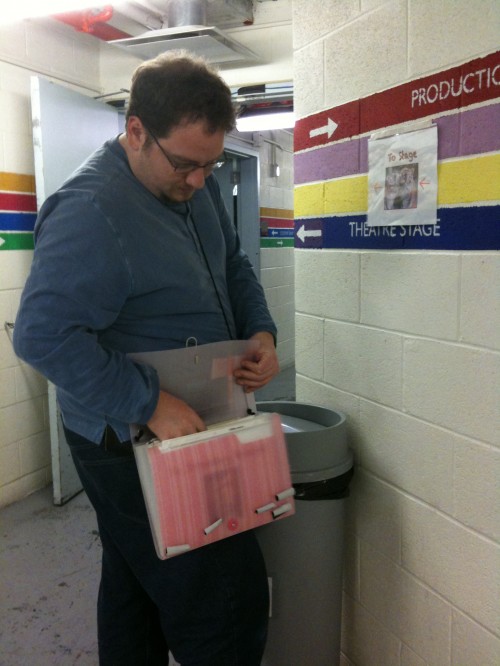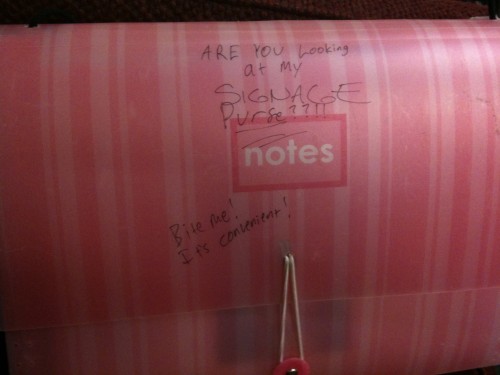Nick has already done his crew post, but I’m going to do one too.
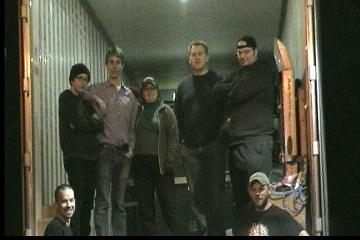
Left-to-right in the photo:
Bobby – Technical Director
Bobby is the boss of the crew, and also takes care of most things involving our travel, like bus calls, hotels, and collects the money for crew rooms and the bus driver’s tip. Bobby spends the entire load-in instructing the local crew in the construction of the set, and at load-out supervises taking it down. He doesn’t have a show track, although he has done the ASM track for a few performances, and did the one move the second props track has when we were short-handed.
Olivia – Props Supervisor
We called Olivia by name as “Props” for a couple venues, when it was discovered that that was her billing in the program (as opposed to everybody else who’s “Lighting Director,” “Wardrobe Supervisor,” “Sound Supervisor,” etc.). That got straightened out when we got to New York, where she was then “Properties Supervisor,” which we all then said in a haughty voice. Now she seems to just be “Props Supervisor.” Naturally, she’s in charge of props. She’s also our truck boss. She and I keep the truck pack paperwork updated as things change.
Devon – Lighting Director / Balcony Safety Test Dummy
Devon supervises the preparation of the lights during load-in, but spends most of his time on his Macbook Pro, creating a custom light plot for every venue, that takes into account how many instruments they have (and what kind), how many dimmers are available, and what kind of lighting positions exist. Basically every venue gets their own lighting design that recreates the original as much as possible with what’s available. Because he spends so much time looking at each venue, he’s often the first to catch potential problems and warn me and Bobby when we might need to prepare for something.
He is also the Balcony Safety Test Dummy because he is often the first person to stand on the balcony when it’s installed, before the stairs are attached to it. A lot of our focus can’t be accomplished until the balcony is up, so Devon is usually chomping at the bit to get on it as soon as it’s “safe.”
Me! – Production Stage Manager
I do all the PSM stuff of course — I call the show, write reports, make sure the cast has whatever show-related information they need (since I don’t travel with them, the company manager handles their day-to-day schedule, aside from rehearsal or show calls). During load-in, I look over the space with Nick and do some basic set-up stuff (claiming our office space, printing any additional signage needed), and then go help Devon with focus for the next few hours. During load-out I’m on the truck crew, and maintain the truck pack paperwork.
Jason – Wardrobe Supervisor
Jason also served as Assistant Costume Designer on the show, so he’s been with the show longer than the rest of the crew. Naturally he maintains all the costumes and wigs, and he also has a full show track, which incorporates all the most difficult parts of the three wardrobe/hair tracks that existed at the Guthrie, so that the cast has a consistent person doing their most difficult changes. He is also on the truck crew, where he is immensely valuable for his height, long arms, and strength. Jason and I do the wall pack, which is its own special kind of Tetris with dozens of different-shaped pieces that have to go in the right way or else they won’t fit.
Nick – Stage Manager / Human Cue Light
Unless you’ve been blog-reading under a rock, you will have seen me reference Nick’s Tour Blog before. Nick has been my assistant since last year. During load-in he does most of the stage management stuff, such as putting up the callboard and directional signage around the theatre (using his signage purse), taping actors’ names over their dressing tables, distributing and collecting valuables bags, and using his trusty roll of white gaff tape to mark out which wings actors should enter from, and where obstacles exist backstage. He also assists Olivia with the setup of prop tables and the placement of Fred the Platform, which almost always requires some discussion. During the show he runs the deck. His track consists mostly of being a human cue light, cueing actor entrances (and a few crew moves) with hand signals. We decided this was easier and more reliable than worrying about actual cue lights, and unlike last year, his track is really simple, and without those cues he’d probably die of boredom. At load-out he’s on the truck crew, where his specialty is strapping all our stair units to overhead load bars.
Matt – Sound Supervisor / Stunt Carpenter
Matt loads in the sound equipment and mixes the show, as well as tying our wireless comm into the house system and making sure there are backstage monitors, and paging when available. He has one of the shorter load-ins, so he has taken on a role we like to call Stunt Carpenter, because he does a few specific parts of the set construction that are too difficult and/or dangerous to give to the local crew, most notably the attachment of the cornices (which are huge and waaaay heavier than they should be) to the top of the set. If he’s done with his Stunt Carpenter duties onstage, he usually joins the truck crew for the part of the truck pack where the cornices and other large objects are lofted up over the road boxes into the nose of the truck.
VIDEOS
Bobby has been filming our load out from various locations in and outside the theatre. He has compiled all these into a single video showing the entire process. Note especially the part of the truck footage where we occupy ourselves for the half hour we spend waiting for the walls to be down.
If you’re interested in seeing more, the videos are online in their entirety:



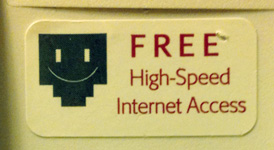 Look at this smug little anthropomorphized ethernet jack. Lies. All lies. Now, a hotel advertising “high speed internet” almost always means that one time, about 10 years ago, their bandwidth would have been considered high speed. When I installed my first 56K modem I felt like I had put a rocketship in my computer too, so I get where they’re coming from. But seeing the little sticker on the wall when I checked in did not fill me with hope. I did kind of expect that there would be something coming out of it, though.
Look at this smug little anthropomorphized ethernet jack. Lies. All lies. Now, a hotel advertising “high speed internet” almost always means that one time, about 10 years ago, their bandwidth would have been considered high speed. When I installed my first 56K modem I felt like I had put a rocketship in my computer too, so I get where they’re coming from. But seeing the little sticker on the wall when I checked in did not fill me with hope. I did kind of expect that there would be something coming out of it, though.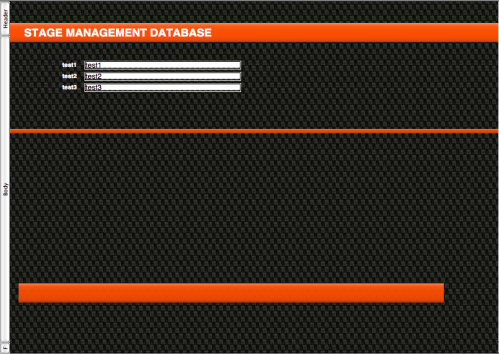
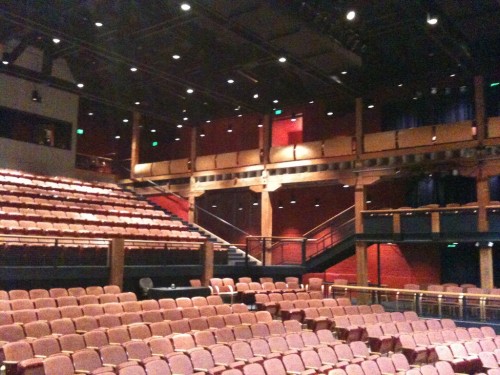
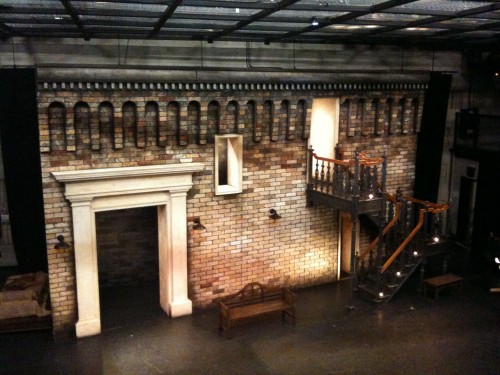
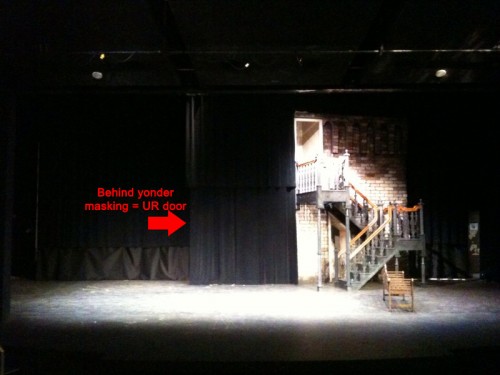
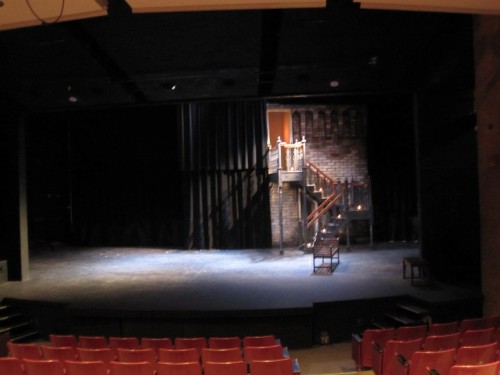
 My Twitter feed lit up the other day with news that
My Twitter feed lit up the other day with news that 